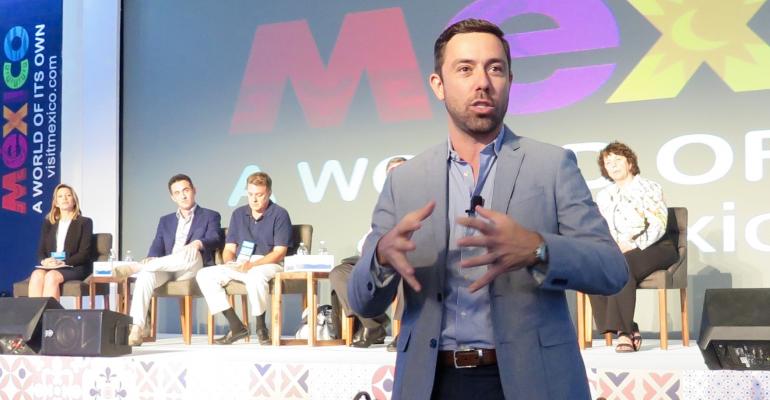The background and the array of characters people meet in each destination determine whether it will be a happy story, said the moderator, Arnaldo Zanonato, senior manager, Port Adventures, Disney Cruise Line and chairman, FCCA shore excursions committee.
Since the first thing passengers see is the port, it needs to make a good impression. It should be clean, safe and friendly, according to Colin Murphy, regional coordinator, the Americas, Global Ports Holding.
'Try to think of your destination from the guest's experience,' Murphy told the FCCA audience, which included many ports, tourism officials and tour operators. 'The security guys should be smiling and friendly,' he said. And 'polish your brand. Create a sense of place.'
Murphy also noted that with more than 80 newbuilds on order, ports have to plan for growth. One way that European ports manage that is through public-private partnerships, and this presents a possibility for the Caribbean.
'The first impression is key to providing an authentic and memorable experience,' agreed Erika Tache, director, product development, shore excursions, Carnival Cruise Line. Passengers should be welcomed, not mobbed by vendors selling T-shirts and sunglasses.
'We love events, local music, a folkloric show to give people a flavor of the destination,' Tache said.
Ports should offer shaded areas and places to sit, crucial for people with mobility issues and families with children. Wheelchair access is vital, too.
Tache said good wayfinding is a must, and the tour dispatch area needs to be well-organized.
Guides are the destination's ambassadors. 'They should be in uniform, well-dressed and look professional, with a visible name tag,' she advised.
An exceptional first and last experience of the destination, according to Tache, helps boost ratings, make happy guests and return guests.
Continuing on the storytelling theme, cruisers meet the characters in their story as soon as they step off the ship.
'Will that front-line guide be a hero or villain?' said Beth Kelly Hatt, president, Aquila Center for Cruise Excellence.
The best guides, she said, show more—they carry props that leave an impression. In Atlantic Canada—Aquila's home turf—guides may show pictures of the destination in deep winter snow, demonstrate a moose-calling device or share samples of dulse (edible seaweed).
'The more senses your guide engages—touch, smell and taste—the better,' Zanonato concurred.
It's important to understand each line's passengers, their demographics and where they're from, urged Albino Di Lorenzo, VP cruise operations, MSC Cruises USA. 'What works for Americans may not work for Europeans,' he said.
Also, while Americans may have visited the region many times, for Europeans, the Caribbean is the 'vacation of a lifetime,' and they want to get the most out of it on tours with guides who speak their language.
There is no other business where relationships are so important, added Federico González-Denton, associate VP, government relations, Royal Caribbean Cruises Ltd. He related how, after the recent hurricanes, tour operators were in direct communication with cruise lines that couldn't reach government officials.
'Having that relationship with you, the tour operators, made a huge, huge difference,' Gonzalez-Denton told the FCCA audience.
He asked tour operators to communicate with other players in their destination who have the power to influence the 'story' cruisers experience. 'The immigration guy could change that story you're trying to tell,' Gonzalez-Denton said.
Veteran cruise line shore excursions executive Mico Cascais, principal of Mico Cascais Inc., sees great opportunity for everyone but since founding his consultancy, he realized how much money is being left on the table by destinations.
'When you meet with the cruise lines, have a fully developed business plan. Value and profitability need to be part of your discussions,' Cascais said. Operators need to specify how they're giving more value and why this will generate more profits.
As ships get larger, a much greater percentage of passengers need to buy excursions, and that's not happening, Cascais added. Don't let 'untrained guides'—those working for independent companies—tell a destination's story, he said.
'Make sure they're regulated, carry proper insurance, etc. That's how destinations can control [the independents].'
Moreover, Cascais sees vast opportunity for the Caribbean to capitalize on its history. As one example, the region was the 'piracy center of the universe. Take that history and make a story.'
When it comes to tours, innovation is needed, the panelists agreed. Carnival's Tache advised operators to develop a new product every year.
As an epilogue to the workshop, Zanonato described his 72-year-old grandmother's delight at a dolphin-watching tour and even the novelty of putting on a snorkel mask. These are memories of a lifetime.
'Don't take anything for granted,' he said.
Copyright © 2024. All rights reserved. Seatrade, a trading name of Informa Markets (UK) Limited. Add Seatrade Cruise News to your Google News feed.


